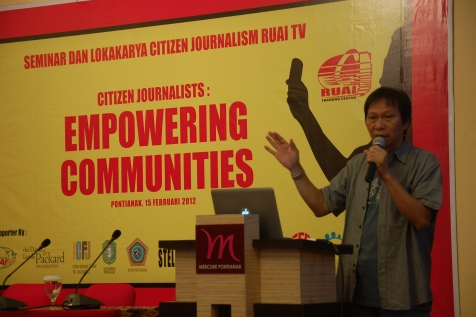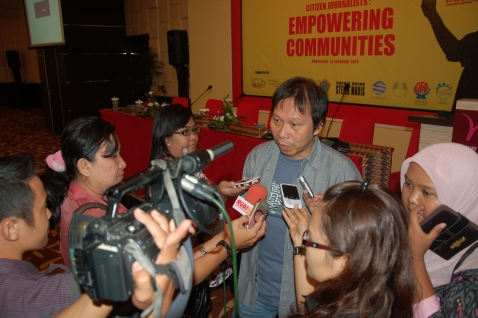
In a rural corner of Indonesia’s West Kalimantan province, indigenous people can now send out the important news in their communities, thanks to a groundbreaking cell phone-based network officially launched this month by Knight International Journalism Fellow Harry Surjadi.
The new service – which opens up a part of the country previously cut off from news coverage – had its public debut at a press conference on February 15 in the provincial capital of Pontianak. About 200 people – including government officials, journalists, and activists who work to address problems in indigenous populations – were on hand for the “Citizen Journalists: Empowering Communities” launch and a demonstration of the service.
“The system is empowering indigenous communities that often struggle for their rights,” Surjadi said. “It has helped them tell the general public what really happens in their communities, which is something they never imagined could happen.”
Surjadi has trained 150 citizen journalists to serve as reporters for this news service. They can either call a number to verbally report news through RuaiSwara, or they can text the news using the RuaiSMS service. Editors at Ruai TV, a partner in the venture, vet the accounts, then publish them on their website and make them available to subscribers. The text messages are also broadcast in a news ticker on Ruai TV, which reaches 300,000 people.

The service is the first international expansion of a system called CGNet Swara created in India by Knight International Journalism Fellow Shubhranshu Choudhary. The Indonesian service replicates this voice-based model but adds a texting service. The initiative is also backed by Internews, a media development organization. The International Center for Journalists administers the Knight International Journalism Fellowships.
Already reports through RuaiSMS have prompted mainstream reporters to do full stories on Ruai TV and in other media. They include: a land dispute between villagers and oil palm company officials, the death of a riverboat passenger, a vital road in need of repair, and problems with teachers’ pay.
Since the reports ran, the land dispute was resolved, the road was repaired, and the teachers have been paid.
“I hope these services will overcome the information divide in West Kalimantan,” said Stefanus Masiun, director of Ruai TV. “Communities located far away from Pontianak can now get the news and publish their news. These services will help to improve the quality of life in these communities.”